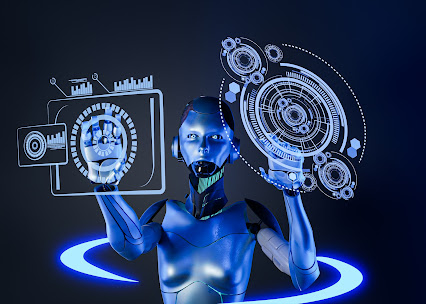The Rise of Artificial Intelligence: From Dreams to Reality
Introduction
Artificial intelligence (AI) has evolved from a science fiction concept to a widespread presence in our daily lives. From its humble beginnings to current advances in machine learning, natural language processing, and robotics, AI's growth has been intriguing and continues to be so. In this article, we will look at the history of artificial intelligence, its extraordinary progress, and the potential societal repercussions. |
| The Rise of Artificial Intelligence |
Early Years: The Birth of Artificial Intelligence
The concept of artificial intelligence originated in ancient times, with myths and legends describing artificial entities with human-like intelligence. However, official research into AI began in the 1950s, with the seminal work of pioneers such as Alan Turing, who established the Turing Test to assess a machine's ability to demonstrate intelligent behaviour.
Early Milestones: Dartmouth Conference and Expert Systems
The Dartmouth Conference in 1956 marked the beginning of artificial intelligence research. This historic gathering gathered together top scientists to investigate the feasibility of constructing machines capable of intelligent behaviour. The subsequent decades witnessed the creation of expert systems, rule-based programmes designed to replicate human skill in certain disciplines, providing the groundwork for practical AI applications.AI Winter and Resurgence: From Neural Networks to Machine Learning
The 1970s and 1980s saw a period known as the "AI winter," which was marked by disillusionment and budget cuts due to missed expectations. However, the rebirth of AI coincided with the introduction of neural networks and machine learning in the 1990s. Breakthroughs in algorithms and processing power drove rapid growth, resulting in advances in pattern recognition, data mining, and predictive analytics.Modern Era: Deep Learning, Natural Language Processing, and Robotics
Deep learning, a form of machine learning that uses neural networks with numerous layers, has propelled the exponential growth of AI over the last decade.Deep learning techniques have transformed fields including computer vision, speech recognition, and natural language processing, allowing for applications such as virtual assistants, language translation, and image recognition.Implications for Society: possibilities and difficulties
The widespread use of AI has enormous promise for society, providing chances to boost productivity, improve healthcare, and address difficult societal concerns. From self-driving cars and personalised medicine to predictive analytics and smart cities, AI has the potential to change every aspect of our lives.However, AI raises substantial problems and ethical concerns. Concerns regarding employment displacement, algorithmic prejudice, privacy violations, and the use of AI for nefarious reasons highlight the importance of ethical AI development and deployment.As AI advances, society must address these complicated challenges to guarantee that it serves the greater good and helps mankind as a whole.
The Future of AI: Towards Human-Centered Intelligence
Looking ahead, the future of AI promises fascinating possibilities. Continued advances in AI research, combined with interdisciplinary collaborations, are likely to result in even more advanced AI systems capable of thinking, creativity, and empathy—all attributes usually associated with human intelligence.Conclusion
The evolution of artificial intelligence demonstrates human ingenuity and curiosity. AI has advanced rapidly since its birth, altering our understanding of intelligence and technological potential. As we navigate the future of AI, we must be watchful, aware of both the potential and challenges that it provides. By embracing AI responsibly and ethically, we can harness its transformational power to create a better, more fair future for everyone.





0 Comments